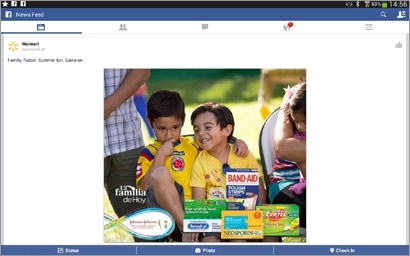Commentary
World Cup 2014: A Marketer's Epilogue
- by Maarten Albarda , Featured Contributor, July 14, 2014
I have written in the last few weeks about the irrelevance of sponsor recognition research, the monetization strategy that was great for ESPN but bad for its viewers, and marketers’ poor performance grasping the opportunity that the event presented in digital media.
So in good event tradition, let me recap with a few trophies:
Best Foot(ball) in Mouth:
The real-time-marketing tournament was a closely fought category. There were noticeable booboos by Delta and KLM, and heroics by Snickers. But the final contenders were Walmart working with Johnson & Johnson through Facebook, and McDonald’s, with an effort to integrate the football pitch ad boards and YouTube.
The J&J effort, which I saw
twice in my feed, was a hodgepodge of Johnson & Johnson products superimposed on a picture of two kids, a J&J logo and Spanish copy accompanied by an English FB message. I hope J&J got a
lot of extra shelf space and promotional placement for this Nightmare on Retail Street:
advertisement
advertisement
However, McDonald’s was in the end victorious with its #FryFutbal effort. This hashtag appeared in week one of the tournament on the pitch boards, celebrating one of the emptiest calories on the McDonald’s menu -- the French fry -- and replaying key match moments throughout the tournament. Hilariously, some of the videos were published under the “education” category --which seems appropriate, as it taught us that McDonald’s knows how to score its own goal, given the opportunity. One of the videos starts with a potato sitting on a couch watching football.
Don’t get me wrong, I count the McDonald’s French fry as among the best in the world, but I thought the company wanted to move beyond its association with unhealthy fried food. #FryFutball is therefore the clear Worst RTM Trophy winner.
Golden Wallet:
Lionel Messi. We saw him in ads for Gatorade, adidas, Head & Shoulders, Buenos Aires Tourism and Pepsi/Lays. I may have missed one or two (or five) but the only positive that I can say for the marketers that paid the big bucks for the mostly sulking and off-the-mark Messi was that he made it to the final. Sponsors who placed their bets on Ronaldo or Neymar were out well before the event was over.
The Marketing World Champions:
Sadly, we will never know. Most marketers never, ever, go public with their results. This is mostly because they have no clue if the investment paid off. Did the nearly 22,000% lift in Castrol Oil brand mentions on Twitter deliver a lift in market share? Was the fact that Nike and adidas both had the highest levels of sponsor recognition a win for their respective sales departments?
Most marketers have no real interest in measuring true ROI anyway, because the money was spent already and it would be suicide for the CMO to conclude that, in the end, it wasn’t worth it. Better to hide behind empty and meaningless measures like recognition and likes.
And so we close the books on FIFA World Cup 2014, and prepare for World Cup 2018. Of course I will be watching again, hoping for another stellar result for The Netherlands and a better one from Team Marketing. Because that is the beauty of football: Every tournament is a new chance of dreams maybe, just maybe, coming true.



Oh what an indictment! "Most marketers have no real interest in measuring true ROI anyway, because the money was spent already and it would be suicide for the CMO to conclude that, in the end, it wasn’t worth it. Better to hide behind empty and meaningless measures like recognition and likes."
Loved it.